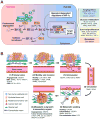Hypoxia and hypoxia-inducible factors: master regulators of metastasis
- PMID: 20962028
- PMCID: PMC3005023
- DOI: 10.1158/1078-0432.CCR-10-1360
Hypoxia and hypoxia-inducible factors: master regulators of metastasis
Abstract
Hypoxia is a common condition found in a wide range of solid tumors and is often associated with poor prognosis. Hypoxia increases tumor glycolysis, angiogenesis, and other survival responses, as well as invasion and metastasis by activating relevant gene expressions through hypoxia-inducible factors (HIF). HIF-1α and HIF-2α undergo oxygen-dependent regulation, and their overexpression is frequently associated with metastasis and poor clinical outcomes. Recent studies show that each step of the metastasis process, from the initial epithelial-mesenchymal transition to the ultimate organotropic colonization, can potentially be regulated by hypoxia, suggesting a master regulator role of hypoxia and HIFs in metastasis. Furthermore, modulation of cancer stem cell self-renewal by HIFs may also contribute to the hypoxia-regulated metastasis program. The hypoxia-induced metastatic phenotype may be one of the reasons for the modest efficacy of antiangiogenic therapies and may well explain the recent provocative findings that antiangiogenic therapy increased metastasis in preclinical models. Multiple approaches to targeting hypoxia and HIFs, including HIF inhibitors, hypoxia-activated bioreductive prodrugs, and gene therapies may become effective treatments to prevent or reduce metastasis.
©2010 AACR.
Conflict of interest statement
No potential conflicts of interest were disclosed.
Figures

Similar articles
-
Hypoxia-inducing factors as master regulators of stemness properties and altered metabolism of cancer- and metastasis-initiating cells.J Cell Mol Med. 2013 Jan;17(1):30-54. doi: 10.1111/jcmm.12004. Epub 2013 Jan 10. J Cell Mol Med. 2013. PMID: 23301832 Free PMC article.
-
ITGA6 is directly regulated by hypoxia-inducible factors and enriches for cancer stem cell activity and invasion in metastatic breast cancer models.Mol Cancer. 2016 Mar 22;15:26. doi: 10.1186/s12943-016-0510-x. Mol Cancer. 2016. PMID: 27001172 Free PMC article.
-
Hypoxia-Inducible Factors: Master Regulators of Cancer Progression.Trends Cancer. 2016 Dec;2(12):758-770. doi: 10.1016/j.trecan.2016.10.016. Epub 2016 Nov 16. Trends Cancer. 2016. PMID: 28741521 Review.
-
Hypoxia-mediated metastasis.Adv Exp Med Biol. 2014;772:55-81. doi: 10.1007/978-1-4614-5915-6_3. Adv Exp Med Biol. 2014. PMID: 24272354 Review.
-
Targeting Hypoxia-Inducible Factor-1-Mediated Metastasis for Cancer Therapy.Antioxid Redox Signal. 2021 Jun 20;34(18):1484-1497. doi: 10.1089/ars.2019.7935. Epub 2021 Jan 25. Antioxid Redox Signal. 2021. PMID: 33198508 Review.
Cited by
-
Factors Affecting EWS-FLI1 Activity in Ewing's Sarcoma.Sarcoma. 2011;2011:352580. doi: 10.1155/2011/352580. Epub 2011 Nov 10. Sarcoma. 2011. PMID: 22135504 Free PMC article.
-
Crosstalk of Oncogenic Signaling Pathways during Epithelial-Mesenchymal Transition.Front Oncol. 2014 Dec 11;4:358. doi: 10.3389/fonc.2014.00358. eCollection 2014. Front Oncol. 2014. PMID: 25566498 Free PMC article. Review.
-
MicroRNAs in Metastasis and the Tumour Microenvironment.Int J Mol Sci. 2021 May 4;22(9):4859. doi: 10.3390/ijms22094859. Int J Mol Sci. 2021. PMID: 34064331 Free PMC article. Review.
-
Circular RNA hsa_circ_0004543 Aggravates Cervical Cancer Development by Sponging MicroRNA hsa-miR-217 to Upregulate Hypoxia-Inducible Factor.J Oncol. 2022 Mar 9;2022:4031403. doi: 10.1155/2022/4031403. eCollection 2022. J Oncol. 2022. PMID: 35310917 Free PMC article.
-
Tumor Microenvironment and Cell Fusion.Biomed Res Int. 2019 Jul 11;2019:5013592. doi: 10.1155/2019/5013592. eCollection 2019. Biomed Res Int. 2019. PMID: 31380426 Free PMC article. Review.
References
-
- Harris AL. Hypoxia [mdash] a key regulatory factor in tumour growth. Nat Rev Cancer. 2002;2:38–7. - PubMed
-
- Semenza GL. Targeting HIF-1 for cancer therapy. Nature Rev Cancer. 2003;3:721–2. - PubMed
-
- Winter SC, Buffa FM, Silva P, et al. Relation of a hypoxia metagene derived from head and neck cancer to prognosis of multiple cancers. Cancer Res. 2007;67:3441–9. - PubMed
Publication types
MeSH terms
Substances
Grants and funding
LinkOut - more resources
Full Text Sources
Other Literature Sources

